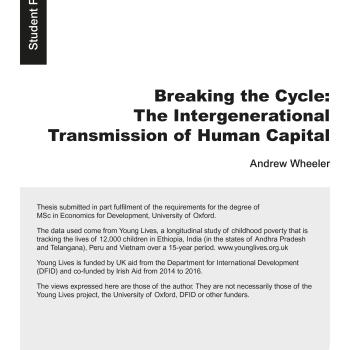
This paper examines the causal effect of parental education on the cognitive and non-cognitive development of children.
The author finds that a parent’s education is a strong determinant of their child’s verbal aptitude, numerical aptitude and educational aspirations. Parents who complete high school rather than just primary school will on average lift their children’s cognitive performance by 24 percentiles in maths, 15 percentiles in vocabulary and 23 percentiles in reading tests. Children of these parents will also aspire to complete two more years of schooling. Somewhat surprisingly, the author finds that parental education has no impact on children’s self-esteem or self-efficacy. These results are robust to various specifications. The author estimates these effects using instrumental variables, taking a change in education policy with differential effects on North Vietnam and South Vietnam as the instrument. The instruments used are relevant and strong, and there is sound cause to believe that they are valid. To the author's knowledge, this is the first study to derive a causal relationship between parental education and non-cognitive development. It also contributes to the literature on the causal relationship between parental education and cognitive development.

This paper examines the causal effect of parental education on the cognitive and non-cognitive development of children.
The author finds that a parent’s education is a strong determinant of their child’s verbal aptitude, numerical aptitude and educational aspirations. Parents who complete high school rather than just primary school will on average lift their children’s cognitive performance by 24 percentiles in maths, 15 percentiles in vocabulary and 23 percentiles in reading tests. Children of these parents will also aspire to complete two more years of schooling. Somewhat surprisingly, the author finds that parental education has no impact on children’s self-esteem or self-efficacy. These results are robust to various specifications. The author estimates these effects using instrumental variables, taking a change in education policy with differential effects on North Vietnam and South Vietnam as the instrument. The instruments used are relevant and strong, and there is sound cause to believe that they are valid. To the author's knowledge, this is the first study to derive a causal relationship between parental education and non-cognitive development. It also contributes to the literature on the causal relationship between parental education and cognitive development.

